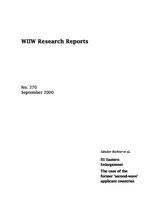EU Eastern Enlargement: the case of the former 'second-wave' applicant countries
wiiw Research Report No. 270, September 2000
47 pages including 7 Tables
In December 1999 the European Union did away with the division of the candidate countries into two different groups; in early 2000 accession negotiations began with the former second-wave countries as well. In the first part of this paper the background of this development and its possible impact on the various groups of EU applicants is analysed. The conclusion is that the EU's decision can best be interpreted as a politically motivated gesture. From an economic point of view, neither the analysis of the Commission's findings published in the 1999 Regular Report about the maturity of the former second-wave candidate countries for full membership, nor these countries' macroeconomic performance and level of development - compared to the EU average or the former first-wave candidate countries - justify the Commission's decision. Nevertheless the original dual distinction indeed does not seem to hold any longer. A 'snapshot' of the situation in summer 2000 shows that the spectrum of EU candidates according to their maturity for accession ranges from Hungary, Poland and Slovenia as the countries best prepared to Bulgaria and Romania as less prepared. The other five candidate countries lag, in one or more respects, somewhat behind the leading trio, with good chances for catching up within a short time.
In the second part of this paper five short reports by authors from the former second-wave countries analyse the impact of the EU's decision in their home countries. It turns out that a broad spectrum of the political elite in the countries involved responded positively to the EU's invitation. Preparatory activities for accession have been stepped up in each country concerned. The results of public opinion polls made after the invitation to start accession talks show that those supporting the idea of joining the EU outnumber those opposing it; yet in some of the former second-wave countries 'eurosceptics' represent a considerable part of the population. The legal harmonization process is in progress, but a lot remains to be done, in particular in law enforcement and control. The country reports refer to the likely problematic chapters of the 31 to be negotiated in the accession talks. The reports address the accession-related expectations in the business sector, the actual problems of competitiveness and the programmes initiated to enable domestic firms to face the challenge of accession to the EU - a perspective that has become somewhat less remote after the Helsinki decision.
Keywords: EU enlargement, 'second-wave' applicant countries, 'Helsinki group' candidates, accession negotiations, maturity for EU membership, costs of and benefits from EU accession
JEL classification: F02, F15, F42
Countries covered: Bulgaria, Czechia, Estonia, Hungary, Latvia, Lithuania, Poland, Romania, Slovakia, Slovenia, Baltic States, SEE, Visegrad countries
Research Areas: Macroeconomic Analysis and Policy
